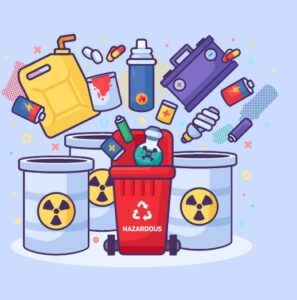Overview
The “Sustainable Approach to Hazardous Waste Management Training” course is designed to equip participants with the knowledge and skills necessary to manage hazardous waste in an environmentally responsible and cost-effective manner. The curriculum emphasizes the principles of the waste management hierarchy, recognizing waste as a resource, and aims to both protect the environment and maximize profit.

Course Objectives
-
Understanding Hazardous Waste:
- Equip participants with knowledge about the types, classifications, and sources of hazardous waste.
- Understand the environmental and health risks associated with hazardous waste.
-
Regulatory Compliance:
- Familiarize participants with international and local regulations governing hazardous waste management.
- Ensure compliance with environmental laws and standards.
-
Implementing Sustainable Practices:
- Introduce sustainable and innovative methods for waste minimization, treatment, and disposal.
- Promote the use of waste as a resource through recycling, reuse, and recovery techniques.
-
Developing Management Plans:
- Train participants to create and implement effective hazardous waste management plans tailored to organizational needs.
- Incorporate pollution prevention and sustainability into waste management strategies.
-
Risk Mitigation:
- Identify and mitigate risks associated with hazardous waste handling, transportation, and disposal.
- Ensure safety for workers, the public, and the environment.
-
Practical Application:
- Provide hands-on tools and frameworks to address real-world hazardous waste challenges.
- Empower participants to apply sustainable waste management principles in various industries.
Course Methodology:
This training course will employ a combination of theoretical explanation, scientific analysis, and hands-on applications. Participants will engage in discussion sessions, case studies, and group activities focused on governance standards, applications, and compliance monitoring. The course will incorporate the latest instructional techniques for enhanced participant understanding and engagement.
Overall, the course drives positive change by equipping participants with the tools and understanding to manage hazardous waste in a way that protects the environment, safeguards health, and supports sustainable development.
Learning Outcomes
Upon completing this course, participants will:
- Identify different types and classifications of hazardous waste.
- Understand the environmental, health, and safety risks associated with hazardous waste.
- Gain familiarity with local and international regulations governing hazardous waste management.
- The Importance of Sustainable Hazardous Waste Management
Explore the role of sustainable practices in hazardous waste management to
support the circular economy. - Understanding Hazardous Waste
Identify types, sources, characteristics, and environmental and health
impacts of hazardous waste. - Modern Waste Management Hierarchy
Learn the principles of the waste management process, including the
hierarchy triangle. - Regulatory Framework and Compliance
Understand legal requirements, permits, and organizational
responsibilities in hazardous waste management. - The Hazardous Waste Journey
Trace the lifecycle of hazardous waste from generation, transportation,
and treatment to final disposal. - Harnessing the Value of Waste
Highlight opportunities for reuse and recycling, turning waste into a
valuable resource. - Innovative Waste Management Technologies
Discover cutting-edge technologies to transform hazardous waste into
resources. - Environmental Impact Assessment (EIA)
Learn EIA procedures, steps, and their importance in hazardous waste
recycling projects. - Practical EIA Preparation
Gain hands-on experience preparing an EIA for a hazardous waste recycling
facility. - HSE Best Practices and Risk Management
Understand best practices, risk analysis, hazard identification, and
mitigation measures in waste facilities. - Avoiding Common Violations
Learn strategies to prevent compliance violations in hazardous waste
facilities. - Safe Handling and Emergency Planning
Discuss safe handling, storage, disposal, and emergency response measures
for hazardous waste. - Hazardous Waste Transportation
Examine safe practices and regulatory requirements for waste transport. - Sustainable Disposal Alternatives
Assess landfill impacts and explore eco-friendly alternatives.
- Best Practices in Waste Treatment and Recovery
Identify techniques for effective hazardous waste treatment and resource
recovery. - Opportunities in Waste Prevention
Learn cost-efficient waste management strategies and regional success
stories. - Energy from Waste
Explore options for energy generation through anaerobic digestion and
waste-to-energy technologies. - Advanced Recycling Technologies
Delve into recycling methods for:- E-Waste and Batteries
- Sewage treatment and fertilizer production
- Waste-to-energy initiatives
- Stakeholder Roles in Sustainability
Discuss how stakeholders contribute to promoting sustainable hazardous
waste management practices.
Target Audience
- Environmental and safety professionals such as environmental officers, HSE managers, and sustainability consultants.
- Waste management personnel, including hazardous waste coordinators, handlers, and recycling professionals.
- Industry leaders and managers responsible for operations, production, facility management, and supply chain oversight in industries that generate hazardous waste.
- Regulatory and compliance authorities, such as environmental regulators and government officials involved in policy enforcement.
- Engineers and technical staff, including chemical, process, and environmental engineers, as well as laboratory technicians working with hazardous substances.
- Educators and researchers in environmental management, sustainability, and waste management disciplines.
- Organizations and institutions such as manufacturing companies, chemical plants, oil and gas industries, and NGOs focusing on environmental protection.
- Individuals interested in sustainability and looking to enhance their knowledge and skills in sustainable hazardous waste management practices.
Course Duration:
The course will be conducted over four days, with each day focusing on one of the course modules.
Benefits of Participation:
- Enhanced Knowledge: Gain in-depth understanding of hazardous waste management principles, practices, and sustainability approaches.
- Regulatory Compliance: Learn to navigate and comply with local and international environmental laws, reducing the risk of fines and penalties.
- Improved Environmental Practices: Acquire skills to implement sustainable waste management strategies, contributing to environmental protection and conservation.
- Cost Savings: Discover waste minimization and resource recovery techniques that reduce disposal costs and improve operational efficiency.
- Risk Reduction: Learn to identify, assess, and mitigate risks associated with hazardous waste, ensuring safer workplaces and communities.
- Career Advancement: Boost your professional credentials and open opportunities in environmental management and sustainability roles.
- Practical Application: Develop actionable skills and frameworks to solve real-world waste management challenges.
- Leadership in Sustainability: Empower yourself or your organization to lead in environmental stewardship and corporate social responsibility.
- Networking Opportunities: Connect with professionals, experts, and peers in the field, fostering collaboration and shared learning.
- Global Impact: Contribute to achieving sustainability goals and promoting practices that benefit society and the planet.

Course Instructor
Mohamed Salih is a highly qualified HSE professional with a Master’s in Water and Environmental Management from the University of Brighton, UK, and certifications as a NEBOSH Trainer in Environmental and Process Safety Management. He brings extensive experience in hazardous waste management, environmental compliance, and sustainable practices. Key achievements include: Leading major projects in contaminated soil remediation and sludge treatment. Successfully implementing ISO certifications for integrated environmental and safety management systems. Delivering impactful HSE training to enhance sustainable waste management practices. With a proven track record and global expertise, Mohamed is an ideal instructor for sustainable hazardous waste management.
Services Provided
Time: February 11, 2025
Duration: 3 days
Hours: 18 hours
Place: ISTC Hall
Scientific material (on a flash drive), a training kit – including scientific material, office supplies, certificates, and recognition for sponsors and participating company managers – appreciation certificates and shields.
Additional Services: coffee break.
